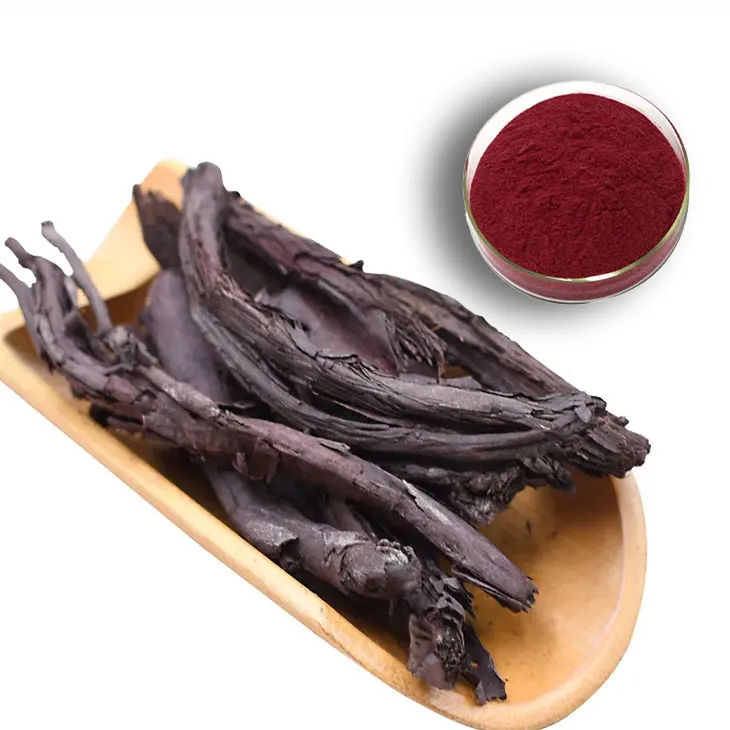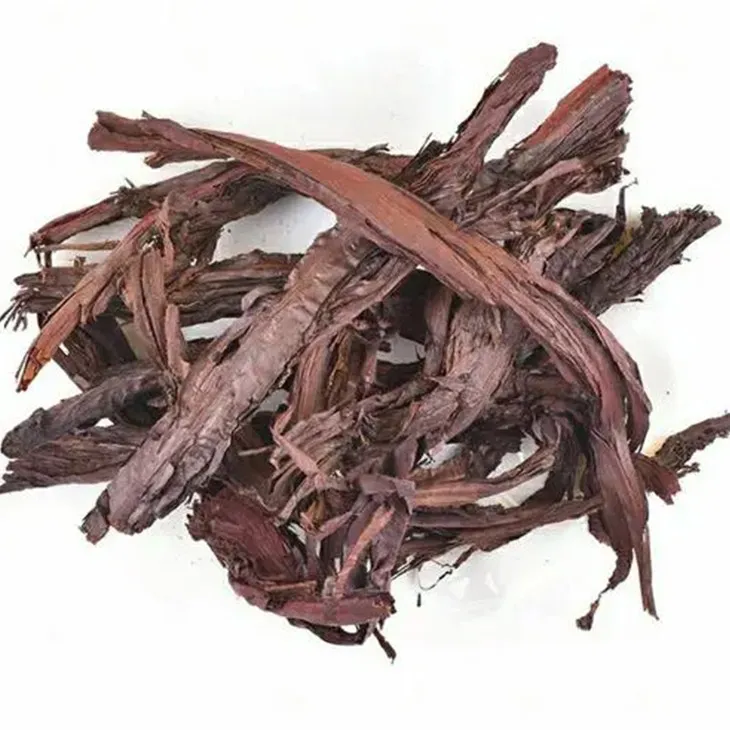- 0086-571-85302990
- sales@greenskybio.com
Shikonin Suppliers.
2024-11-30

1. Introduction to Shikonin
Shikonin is a remarkable natural compound that has drawn significant attention in recent years. It is both a natural pigment and a valuable medicinal ingredient. Shikonin's vibrant color makes it an appealing choice in the cosmetic and food industries as a natural coloring agent. In the medical field, it has shown a wide range of potential therapeutic effects, such as anti - inflammatory, antibacterial, and antitumor properties.

2. The Growing Market Demand for Shikonin
The demand for shikonin in the market has been on a steady increase. In the cosmetic industry, consumers are increasingly inclined towards natural products. Shikonin-based cosmetics, such as lipsticks and blushers, are favored for their natural origin and potential skin - friendly properties. In the food sector, as the trend of using natural colorants instead of synthetic ones gains momentum, shikonin offers an excellent alternative. Moreover, in the pharmaceutical industry, with the continuous exploration of its medicinal properties, the need for high - quality shikonin for research and drug development is also rising.

3. Roles and Responsibilities of Shikonin Suppliers
Shikonin suppliers play a crucial role in the shikonin supply chain. Their responsibilities are multi - faceted.
3.1 Production
Suppliers need to ensure an efficient and sustainable production process. For those who rely on traditional extraction from plants like Lithospermum erythrorhizon, they must manage the cultivation or collection of the raw materials properly. This involves ensuring the right growing conditions for the plants, such as soil quality, sunlight exposure, and water supply. In addition, they need to optimize the extraction process to maximize the yield of shikonin while minimizing waste.
3.2 Quality Assurance
Quality assurance is of utmost importance. Suppliers must implement strict quality control measures at every stage of production. This includes testing the raw materials for purity and authenticity, as well as monitoring the quality of the intermediate and final products. They need to ensure that the shikonin they supply meets the required purity levels, is free from contaminants, and has consistent chemical properties.
3.3 Distribution
Effective distribution is also a key responsibility. Suppliers should have a well - organized distribution network to ensure that shikonin reaches its customers in a timely and cost - effective manner. This may involve collaborating with logistics partners, managing inventory levels, and handling customs and regulatory requirements for international shipments.

4. Different Approaches in Shikonin Supply
Shikonin suppliers may adopt different approaches to meet the market demand.
4.1 Traditional Plant Extraction
Some suppliers specialize in the traditional extraction of shikonin from plants, with Lithospermum erythrorhizon being a common source.
-
Advantages:
- It provides a natural and "green" source of shikonin. Consumers who prefer natural products are more likely to accept shikonin obtained through this method.
- The extraction process may also yield other beneficial compounds present in the plant, which can potentially enhance the overall quality and functionality of the final product.
-
Disadvantages:
- The supply of raw materials may be limited by factors such as the availability of suitable growing areas for Lithospermum erythrorhizon and the plant's growth cycle. This can lead to fluctuations in production levels.
- The extraction process can be complex and time - consuming, and may require a significant amount of resources, including labor and energy.
4.2 Synthetic Routes
Other suppliers may explore synthetic routes to produce shikonin to meet the large - scale demand.
-
Advantages:
- Synthetic production can be scaled up more easily compared to plant extraction. This allows for a more stable and consistent supply of shikonin to meet the growing market demand.
- It can potentially reduce the cost of production in the long run, as it may be less dependent on variable factors such as weather conditions and agricultural inputs.
-
Disadvantages:
- There may be concerns among some consumers regarding the acceptability of synthetic shikonin, especially in the natural and organic product markets.
- The development of synthetic production methods requires significant investment in research and development, as well as compliance with strict regulatory requirements for synthetic chemicals.
5. Regulatory Compliance for Shikonin Suppliers
A reliable shikonin supplier must be compliant with relevant regulations in different regions.
5.1 In the Cosmetic Industry
In the cosmetic industry, regulations regarding the use of natural colorants like shikonin vary from country to country. Suppliers need to ensure that their shikonin products meet the safety and quality standards set by regulatory authorities. For example, in the European Union, cosmetics are subject to strict regulations under the Cosmetics Regulation (EC) No 1223/2009. Suppliers must ensure that their shikonin - based products are properly labeled, including information on the origin of the ingredient, any potential allergens, and compliance with safety limits.
5.2 In the Food Industry
In the food industry, shikonin used as a food colorant must meet food safety regulations. In the United States, the Food and Drug Administration (FDA) regulates the use of food colorants. Suppliers need to ensure that their shikonin products are approved for use in food, and that they are produced and processed in accordance with Good Manufacturing Practice (GMP) standards. Similar regulations exist in other countries, such as Japan and China, where food safety is a top priority.
5.3 In the Pharmaceutical Industry
In the pharmaceutical industry, the regulatory requirements are even more stringent. If shikonin is used in drug development or as an active pharmaceutical ingredient, suppliers must comply with Good Laboratory Practice (GLP) and Good Manufacturing Practice (GMP) regulations. They need to provide detailed documentation on the quality, purity, and stability of their shikonin products, as well as ensure that their production facilities are inspected and approved by relevant regulatory authorities.
6. Scaling Up Production According to Market Needs
Shikonin suppliers need to have the ability to scale up production according to market needs.
6.1 Market Monitoring
Suppliers should closely monitor the market trends for shikonin - based products. This includes keeping an eye on the growth rate of different industries using shikonin, such as cosmetics, food, and pharmaceuticals. By analyzing market data, they can predict future demand and plan their production expansion accordingly.
6.2 Capacity Expansion
To scale up production, suppliers may need to invest in expanding their production capacity. For those relying on plant extraction, this could involve increasing the area of cultivation for Lithospermum erythrorhizon or improving the extraction facilities to handle larger quantities of raw materials. For suppliers using synthetic routes, it may mean building new production plants or upgrading existing ones with more advanced equipment.
6.3 Resource Management
Scaling up production also requires effective resource management. Suppliers need to ensure that they have sufficient raw materials, labor, and energy resources to support increased production. This may involve establishing long - term contracts with raw material suppliers, recruiting and training additional staff, and optimizing energy consumption in the production process.
7. Maintaining Good Communication with Customers
Shikonin suppliers need to maintain good communication with their customers to understand their specific requirements for shikonin - based products.
7.1 Understanding Customer Needs
Different customers may have different requirements for shikonin products. For example, cosmetic companies may require shikonin with a specific color intensity and purity for their product formulations. Pharmaceutical companies may need shikonin with a high level of chemical purity and stability for drug development. By communicating with customers, suppliers can gain a better understanding of these specific needs and adjust their production processes accordingly.
7.2 Providing Technical Support
Suppliers can also provide technical support to their customers. For example, they can offer advice on the best way to incorporate shikonin into different product formulations, or provide information on the stability and compatibility of shikonin with other ingredients. This can help customers optimize their product development processes and ensure the quality of their final products.
7.3 Building Long - Term Relationships
Good communication is essential for building long - term relationships with customers. By maintaining regular contact, suppliers can build trust and loyalty with their customers. This can lead to repeat business and potential collaboration on new product development or market expansion.
FAQ:
What are the main sources of shikonin for suppliers?
Shikonin suppliers mainly obtain shikonin from plants like Lithospermum erythrorhizon through traditional extraction methods. However, some also explore synthetic routes to meet the large - scale demand.
What qualities should a reliable shikonin supplier have?
A reliable shikonin supplier should be compliant with relevant regulations in different regions. They should have the ability to scale up production according to market needs and maintain good communication with customers to understand their specific requirements for shikonin - based products.
How do shikonin suppliers ensure product quality?
Shikonin suppliers ensure product quality through various means. They may use strict quality control procedures during the extraction or synthesis process. This includes testing for purity, potency, and absence of contaminants. Also, compliance with industry standards and regulations helps in ensuring the overall quality of the shikonin supplied.
What challenges do shikonin suppliers face?
Shikonin suppliers may face challenges such as meeting the growing market demand while maintaining quality. The cost associated with traditional extraction from plants can be high, and synthetic production may face technical difficulties. Additionally, complying with different regional regulations can also be a challenge.
How can customers find a suitable shikonin supplier?
Customers can find a suitable shikonin supplier by researching their reputation in the market. They can look for suppliers with a track record of compliance with regulations and positive customer feedback. Also, considering the supplier's production capacity, quality control measures, and ability to meet specific requirements can help in finding a suitable shikonin supplier.
Related literature
- Production and Application of Shikonin: A Review"
- "Shikonin: Sources, Synthesis, and Pharmacological Properties"
- "The Market and Suppliers of Natural Pigments: Focus on Shikonin"
- ▶ Hesperidin
- ▶ citrus bioflavonoids
- ▶ plant extract
- ▶ lycopene
- ▶ Diosmin
- ▶ Grape seed extract
- ▶ Sea buckthorn Juice Powder
- ▶ Beetroot powder
- ▶ Hops Extract
- ▶ Artichoke Extract
- ▶ Reishi mushroom extract
- ▶ Astaxanthin
- ▶ Green Tea Extract
- ▶ Curcumin Extract
- ▶ Horse Chestnut Extract
- ▶ Other Problems
- ▶ Boswellia Serrata Extract
- ▶ Resveratrol Extract
- ▶ Marigold Extract
- ▶ Grape Leaf Extract
- ▶ blog3
- ▶ blog4
-
Standard - process propolis extract powder.
2024-11-30
-
How to make powder with peppermint oil?
2024-11-30
-
Organic konjac powder, Australia.
2024-11-30
-
Chinese Cassia Seed Extract Suppliers.
2024-11-30
-
Suppliers of Organic Diosmin Powder.
2024-11-30
-
Hesperidin with the best reviews.
2024-11-30
-
Organic Epimedium Extract Powder Supplier.
2024-11-30
-
Berberis aristata Extract
2024-11-30
-
Senna Leaf Extract
2024-11-30
-
Polygonum multiflorum extract
2024-11-30
-
Fenugreek Extract Powder
2024-11-30
-
Calendula Extract
2024-11-30
-
Maca Extract
2024-11-30
-
Pine bark Extract Powder
2024-11-30
-
Coconut Water Powder
2024-11-30
-
Alisma Extract
2024-11-30
-
Wheat Germ Extract
2024-11-30





















